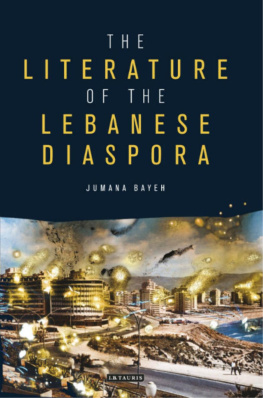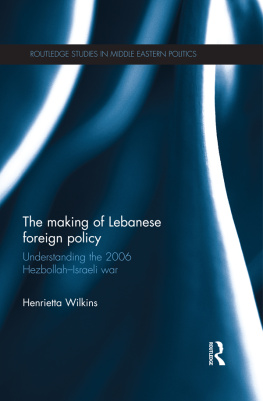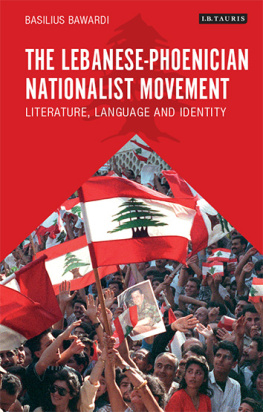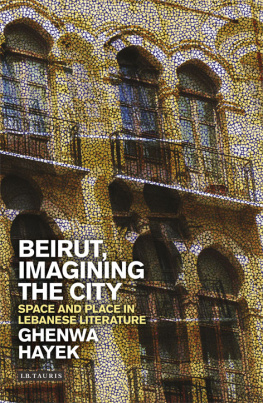Jumana Bayeh is an Early Career Fellow in the Department of Modern History, Politics and International Relations at Macquarie University, Australia. She was most recently a Visiting Research Fellow at the University of Edinburghs Institute for Advanced Studies in the Humanities and has held fellowships at the University of Copenhagen and the Lebanese American University in Beirut.
THE LITERATURE
OF THE LEBANESE
DIASPORA
Representations of Place and
Transnational Identity
J UMANA B AYEH
Published in 2015 by I.B.Tauris & Co. Ltd
6 Salem Road, London W2 4BU
175 Fifth Avenue, New York NY 10010
www.ibtauris.com
Distributed in the United States and Canada
Exclusively by Palgrave Macmillan
175 Fifth Avenue, New York NY 10010
Copyright 2015 Jumana Bayeh
The right of Jumana Bayeh to be identified as the author of this work has been asserted by her in accordance with the Copyright, Designs and Patents Act 1988.
All rights reserved. Except for brief quotations in a review, this book, or any part thereof, may not be reproduced, stored in or introduced into a retrieval system, or transmitted, in any form or by any means, electronic, mechanical, photocopying, Written Culture and Identity recording or otherwise, without the prior written permission of the publisher.
Written Culture and Identity 1
ISBN: 978 1 78076 998 1
eISBN: 978 0 85773 617 8
A full CIP record for this book is available from the British Library
A full CIP record is available from the Library of Congress
Library of Congress Catalog Card Number: available
ACKNOWLEDGEMENTS
This book explores the unconventional and unique representations of place found in Lebanese diaspora fiction. In writing it I was supported by many people and institutions. Marcelle Freiman provided critical and insightful feedback on numerous chapter drafts. These were invaluable to the progress and competition of this book. I am grateful also to Helen Groth for her critical engagement with this project and her professional support and guidance.
Most of this work was completed at Macquarie University and I would like to thank colleagues in the Modern History, Politics and International Relations department as well as the English department for their support over the years. The late Andrew Vincent was unwavering in his enthusiasm for the cross-disciplinary nature of this work, while John Stephens and Geoffrey Hawker ensured that such an approach would be accommodated. Sections of this book were completed while I was away from my university. In 2007, 2011 and 2013 I held research fellowships at the Lebanese American University in Beirut, the University of Copenhagen and the University of Edinburgh. I am indebted to Paul Tabar, Sune Haugbolle and Anthony Gorman for supporting my applications to their institutions, their willingness to discuss the finer points of diaspora and Lebanese politics with me, and integrating me into their seminars and classes. At the University of Edinburgh I was also generously supported by its Institute for Advanced Studies in the Humanities, which was the perfect environment for undertaking the last revisions of this work. Financial assistance from Macquarie University and the Arab Australian Chamber of Commerce and Industry made these research periods abroad possible.
I am immensely grateful to Bill Ashcroft, Saree Makdisi and Lindsey Moore who read and commented on an earlier draft of this book in its entirety. I would like to thank John Keane for his insightful feedback on the political aspects of this work as well as lending me his house while away in Berlin. Thanks to the artists Joana Hadjithomas and Khalil Joreige who gave permission to use one of the images from their Wonder Beirut series for the cover. I am indebted to Azmina Siddique, my editor at I.B.Tauris, who was enthusiastic about this book from the start, and to Allison Walker and Sarah Plant for their copy editing assistance. Of course special thanks must go to David Pritchard, whose constant support and care makes everything possible.
Finally, if this book has anything new to say or, as the maxim goes, if I have seen a little further than others it is because I stood on the shoulders of giants. Those giants are my father, Hanna Bayeh, and my uncle, Youssef Bayeh. Although they are not aware of this, the diasporic sensibility I write about here is derived from my observations of these two longstanding migrants to Sydney, Australia. My father and uncle taught me from a very young age that the events that take place in the world, especially the Middle East, are much more complex than what is represented in the Orientalist portrayals of the region, especially in the mainstream media. While I can hardly say we agree on all aspects of Middle Eastern politics and culture, what I am certain of is that their unsettling, non-conformist and sometimes abrasive views can be traced back to every page of this book.
INTRODUCTION
DIASPORA LITERATURE AND PLACE
In the novel Unreal City (1999) by the Lebanese-British writer Tony Hanania, the unnamed protagonist stands in the centre of war-riven Beirut and describes the ruined city that surrounds him:
As I rested against the parapet I noticed the faint outline of keyhole arches behind my head and painted lozenges and stellae over the crumbled ceilings, and it was only then I realized where I was standing. This had once been the most famous restaurant in all the city where we had sometimes come as a treat on those dreary Sunday afternoons in the years before the war, the tables laid out as if on either side of a souk, each with its centrepiece of beets, white plums, almonds in ice, my mother always in a simple cream slip-dress and an extravagant hat, my father slapping my hands as I flicked pistachios over at the politicos on the other tables.
The street above must have been partially cleared in an earlier truce, and the going was easier through the following three blocks, the peeling yellow paintwork of the Fattal Building rising over the painted faades; across the grassed-over square the upper storey of what was once the Rivoli Cinema, the faded lettering of the billboard still advertising a film from the mid-seventies, The Divorced with Jack Lemmon and ...
While this particular passage focuses on Beirut, oscillating between its pre-war elegance and decimated present, it is exemplary of the fixation with place found in Lebanese diaspora fiction. Alongside Beirut, which is a key site of interest in most Lebanese diaspora novels, other places like the domestic dwelling, the homeland and the nation-state are afforded similar attention.
This book attends to this question of place and how it is represented by several writers who are geographically displaced from their Lebanese homeland. In doing so it focuses on a key aspect that has, according to Avtar Brah, been repeatedly overlooked within diaspora studies. Brah claims that while diaspora is closely linked to a politics of location, its strong association [...] with displacement and dislocation means that the experience of location can easily dissolve out of focus. Lebanese diaspora literatures preoccupation with place draws attention to this lacuna within diaspora studies and challenges many of the underlying principles associated with it. By examining a number of Lebanese diaspora novels and the representations of place contained within them, this book illustrates how literature broadens our understanding of diaspora and encourages us to rethink the ways that the term has been theorised.










